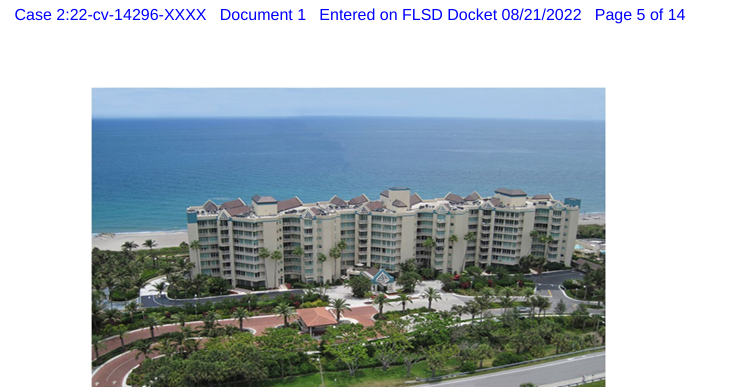by Dennis Crouch
The Copyright Act and the Patent Act each include an attorney fee provision — permitting the district court to award “a reasonable attorney’s fee to the prevailing party.” Because of similarities in the provisions, they tend to be interpreted together — at least with regard to what qualifies as a “prevailing party” under the statute. (Unlike in copyright law, the patent law limits fees to “exceptional case[s]”).
On the Copyright side, there is a growing circuit split on the issue of whether defendants can recover attorney’s fees after a plaintiff voluntarily dismisses under Rule 41(a)(1). That rule permits for voluntary dismissal and does not require a court order. Affordable Aerial Photography, Inc. v. Property Matters USA, LLC, 108 F.4th 1358 (11th Cir. 2024), the 11th Circuit held that “some judicial action rejecting or rebuffing a plaintiff’s claim is necessary to endow a defendant with prevailing party status.” In a parallel decision, the 11th Circuit clarified that a plainttif’s voluntary dismissal does not create a prevailing party status even if made “with prejudice.” Affordable Aerial Photography, Inc. v. Reyes, No. 23-12051, 2024 WL 4024619 (11th Cir. Sep. 3, 2024).
The Federal Circuit has developed a body of law holding that voluntary dismissals with prejudice can support prevailing party status and fee awards in patent cases. See O.F. Mossberg & Sons, Inc. v. Timney Triggers, LLC, 955 F.3d 990 (Fed. Cir. 2020). However, the Federal Circuit generally denies prevailing party status after Rule 41(a)(1) dismissals without prejudice. The Ninth Circuit approach looks to the general question of preclusion – asking whether the plaintiff is “judicially precluded from refiling the claim.” If so, then the defendant qualifies as the prevailing party. Cadkin v. Loose, 569 F.3d 1142 (9th Cir. 2009). So, we have something of a split here between the various circuits.
Property Matters recently petitioned to the Supreme Court for review. The case arose from a fairly typical copyright dispute over the use of a real estate photograph. (Presidential Place Condos in Boca). The plaintiff, Affordable Aerial Photography, voluntarily dismissed its claims against one defendant under Rule 41(a)(1)(A)(i) after the defendant moved to dismiss based on statute of limitations grounds. The defendant then sought to recover its attorney’s fees ($22k) under § 505 of the Copyright Act, which gives courts discretion to award reasonable attorney’s fees to the prevailing party. But, the 11th Circuit found that Section 505 attorney fees were barred based upon the prevailing party limitation.
The practical impact of the Eleventh Circuit’s rule is significant because it offers a clear pathway for plaintiffs to avoid potential fee liability by voluntarily dismissing before any court ruling, even if their claims were objectively unreasonable.
I’ll note here that my docket search shows almost 200 copyright infringement lawsuits filed by Affordable Aerial Photography over the past decade in the S.D. Florida. Folks appear to be finding the photographs online and then using them without permission. AAP appears to be aggressively searching for infringers and going after them for damages. The complaints do not state the search process, only that they involve “ongoing diligent efforts to identify unauthorized use of its photographs.”
= = =
Another copyright attorney fee case is also pending before the Supreme Court. King for Congress v. Griner — although this one focuses on fees available following a Rule 68 offers of judgment. The case arose from a brief use of the famous “Success Kid” meme by former Congressman Steve King’s campaign, which led to a protracted copyright dispute resulting in only minimal statutory damages of $750 for innocent infringement. Prior to trial, King for Congress made a Rule 68 offer of judgment for $15,000 which was rejected by the plaintiff. After the minimal damages award, King for Congress sought to recover post-offer attorney fees under Rule 68, arguing that because 17 U.S.C. § 505 defines attorney fees as part of “costs,” they should be recoverable by a non-prevailing party who made a Rule 68 offer that exceeded the ultimate judgment. I have not independently researched this, but according to the petition, the Eleventh and Second Circuits permit such recovery, reasoning that if attorney fees are defined as “costs” under the relevant statute, they are recoverable under Rule 68 even by a non-prevailing party. However, the Ninth, Seventh, First, and now Eighth Circuits have held that the Copyright Act’s limitation of attorney fees to “prevailing parties” bars such recovery through Rule 68.
= = =
Earlier in 2024, Hasbro petitioned the Supreme Court to resolve a circuit split regarding attorney fee awards under Section 505 of the Copyright Act. The case arose from lengthy litigation over the authorship of The Game of Life, where Hasbro and Reuben Klamer ultimately prevailed against claims by the successors of Bill Markham, a designer hired to help create the game. Although the district court found the case a “close call,” it denied attorney fees under the First Circuit’s restrictive standard requiring the losing party’s position to be “objectively quite weak.” As I mentioned above, the copyright statute does not limit awards to exceptional cases. And the petition highlighted what it argued was a three-way circuit split on the proper standard for awarding fees under Section 505: the Fifth and Seventh Circuits apply a presumption in favor of awarding fees to prevailing parties, the Eighth and Ninth Circuits weigh the factors with no presumption either way, while the First Circuit stands alone in effectively requiring the losing party’s position to be “objectively quite weak.” Court ultimately denied certiorari in March 2024.
